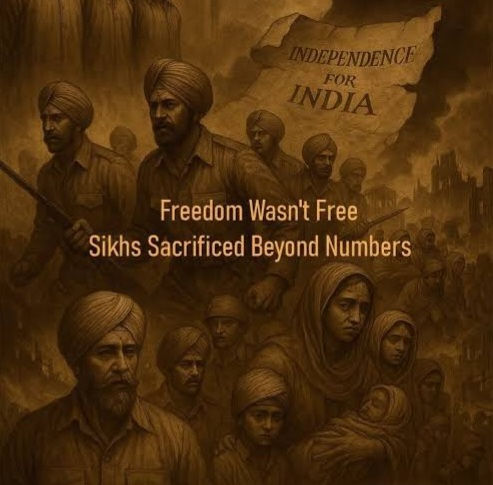The Khalsa Spirit and the Birth of a Free India
- SikhsForIndia

- Aug 12, 2025
- 2 min read
Updated: Aug 13, 2025

The noose swayed gently in the dim light.
On the gallows stood a Sikh revolutionary, his turban neatly tied, his eyes fixed not on the hangman but somewhere far beyond the prison walls. The jailer offered him a last chance to beg for mercy.
He smiled faintly and said,
“Maut nu dar kyon hove? Asi te shaheedan da vansh haan.”
(Why fear death? We are descendants of martyrs.)
The lever dropped. His body fell. His spirit rose. India’s freedom was not handed down — it was wrestled from the grip of an empire by blood, grit, and a will that would not bend. And in that long, punishing fight, there was one community whose footsteps were always found on the frontlines, whose resolve was forged in the fires of centuries of sacrifice — the Sikhs.
The Sikh spirit did not awaken with the coming of the British. It had already been tempered against the Mughal steel, sanctified by the martyrdom of Guru Arjan Dev and Guru Tegh Bahadur, and sharpened in the battles of Guru Gobind Singh. For Sikhs, resistance was not an act of rebellion — it was an act of faith. To submit to tyranny was to betray the very breath God had given them. So when India’s call for freedom rose, the Sikh answer was not measured — it was total. Farmers left their fields, soldiers deserted the comforts of pension, labourers in foreign lands sent their wages not home, but to fund revolutions. The Ghadarites, many of them turbaned men from Punjab’s villages, sailed back knowing that the British gallows would be waiting. They came anyway.
In April 1919, when Jallianwala Bagh ran red, it was not just the earth of Amritsar that drank the blood — it was the conscience of an entire people that was seared. The Akali movement that followed was not merely about control of gurdwaras. It was about proving that no throne — be it in Delhi or London — could dictate to the soul of the Khalsa. Men walked into police batons without lifting a hand in defence, not because they were weak, but because their Gurus had taught them that moral courage breaks empires faster than swords.
The statistics still shock the honest reader: Sikhs were barely 2% of India’s population, yet they filled gallows, prisons, and martyr rolls in numbers that dwarf their share. Families sent not one but multiple sons to the hangman. Mothers washed their children’s hair one last time and told them, Go. Make the Panth proud. Make India free. For Sikhs, independence was never just a tricolour on a pole. It was the sacred right for every man, woman, and child — Hindu, Muslim, Sikh, Christian — to live without fear, to speak without chains, to worship without permission. Their fight was not for themselves. It was for Sarbat da Bhala — the welfare of all.
As the clock struck midnight in 1947, and India took her first breath as a free nation, the sound that should have been heard was the echo of the Ardas from countless gurdwaras, remembering those who had given everything and asked for nothing. The Khalsa spirit did not merely participate in the freedom struggle. It defined its heartbeat.



Comments